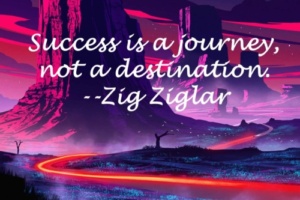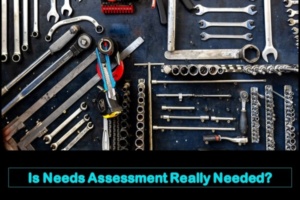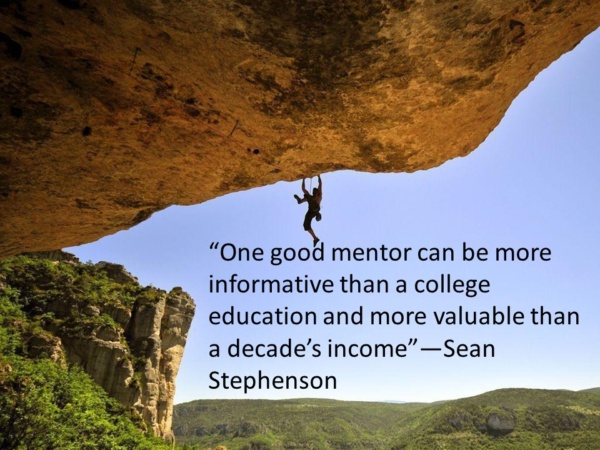
Musings on Mentorship
I believe everyone should start their careers with a mentor–someone to show you the ropes, someone to guide you on the right rope, and someone to catch you when you fall off the tightrope.
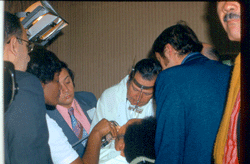
I had the most amazing mentor—my father, Dr. Elliot Feinberg. My father was world-renowned as a pioneer and expert in full coverage restorative dentistry. He gave demonstration courses in his office to dentists for the Ninth District Dental Association. The Fixed Bridgework Course was given on 7 Wednesday mornings with demonstration on patients and slide lectures and the Precision Attachment Course was set up the same way. My father gave that course for 40 years and I had the privilege of assisting him for 23 of those years with Drs. Elbridge Devine and Sam Jacobs. I was in the office working with my father every day and still, when he gave those courses, I picked up on something he never told me. Everything he said meant something, but most of the finer points went completely over the heads of the course participants. A few dentists realized this, so they repeated the courses.
When I first joined my father in practice, I did not jump immediately into treating patients unsupervised. I spent a great deal of time assisting my father at the chair. I watched everything he did carefully. My father had me carving patients’ temporaries, making dies and pouring models in the laboratory. I can carve teeth from nothing and make an immediate denture from scratch while the patient sits in the chair.
After I became adept at laboratory work I began to do some procedures on my father’s patients. I took care of patient emergencies during and after office hours. That’s how patients came to accept me as an excellent practitioner in my own right. My father and I made a great team and the patients knew it!
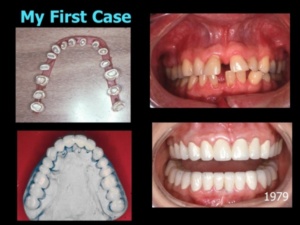
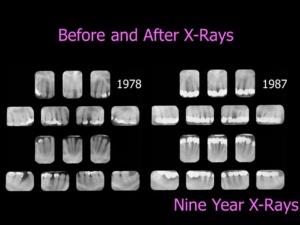 My father lined up full mouth cases for me to do in my first year of practice. The patients couldn’t afford the regular fees, but they were going to pay very little for me to do the work under the careful supervision of my father. My father did not put time constraints or pressure on me to “produce” so I concentrated on doing my best work. My very first case was a fixed bridgework case—and I had to prepare 32 teeth on a patient! My second case was also a full mouth case with upper and lower precision attachment cases. Both cases came out great and lasted for many years in health. I most likely would never have been able to do these cases until I was in practice for at least ten years were it not for my mentor.
My father lined up full mouth cases for me to do in my first year of practice. The patients couldn’t afford the regular fees, but they were going to pay very little for me to do the work under the careful supervision of my father. My father did not put time constraints or pressure on me to “produce” so I concentrated on doing my best work. My very first case was a fixed bridgework case—and I had to prepare 32 teeth on a patient! My second case was also a full mouth case with upper and lower precision attachment cases. Both cases came out great and lasted for many years in health. I most likely would never have been able to do these cases until I was in practice for at least ten years were it not for my mentor.
Attitudes toward education and mentorship were so different when I graduated from dental school in the 1970s. My colleagues and I were keenly aware that “we knew nothing.” When I was in my residency program at Bronx Lebanon Hospital, my fellow residents and I would do anything we could to build our knowledge and skills. If we were told to come on a Saturday for CE—we were there!
But today that doesn’t happen. I gave an hour presentation to residents in a Brooklyn, NY residency program a few years ago. I knew the director of the program through my involvement with the New York State Dental Association. After the presentation, I reached out to him and said, “An hour isn’t enough for me to teach the residents anything. I would like to come on a Saturday at my own expense and spend the day teaching them how to do crown and bridgework. “Oh, they would never come on their time,” he informed me, “only on our time.” I was flabbergasted and dismayed.
Now I am finding out that this attitude is the norm these days. I very much want to be a mentor and pass on to a young practitioner what was given to me. I have 45 years of experience with the most sophisticated full coverage restorative cases that very few dentists—general and prosthodontists can actually do. Would you believe that it has proven to be an extremely difficult task to find someone who actually wants my mentorship? I keep wondering: “How did this generation get to be so smart?” When I started in practice dentists would have banged down the doors to have someone like me help them in practice. I have spoken to friends in other fields and these attitudes are almost universal.
Today’s young practitioners think I’m a dinosaur ; that my practice philosophy and techniques are too time-consuming and passe. “No one can practice like you,” I have been told by many of them. Why? Because I follow a different paradigm. I am not limited by the constraints they were indoctrinated with. As a result, I have unique solutions to restorative problems that are “impossible” according to what they have been told. I can help many patients they are turning away. I have new options for patient treatment that would never occur to them in their current paradigm—both for patients who are candidates for sophisticated dentistry but also for those who are not.
It is not through arrogance when I say I am not impressed with most of the celebrated presenters of full coverage restorative dentistry on the lecture circuit. To me it is obvious why their digital skills often result in less than stellar outcomes. Their cases flagrantly violate the basic principles that enabled my father and I to have such amazing success. Basic principles are the cornerstone of education in the ONWARD program.
Is it any wonder why most practitioners only show cases on hand picked young patients with perfect gingiva and why they don’t show finished X-Rays or follow-up X-Rays of presented cases? I can show cases with follow-up X-Rays over decades on patients with compromising health conditions like heart disease, cancer and diabetes! Without followup X-Rays, students never find out whether the presented cases actually lasted in health. Worse, I have yet to hear anyone question the missing follow-up X-Rays! If a case looks beautiful on the day of insertion, but doesn’t stand the test of time, is that a successful case? I think not!
Unfortunately for me, I cannot offer a mentee panaceas or quick -fix solutions. Worse yet, what I have to offer requires diligence; and there is a learning curve. But today, few individuals are willing to ride the learning curve in order to better themselves. I hear a million excuses:
“it’s too hard,” “it takes too much time,” “it’s not economically feasible,” and “it’s old-fashioned.” I’ve heard them all. What they are really saying is:
“I accept mediocrity;” “I’m afraid to try something new;” “I have to slap something in to make a quick buck.”
But I refuse to skip steps in the name of economic expediency. The famous physician Atul Gawande says in his book Better:
“We 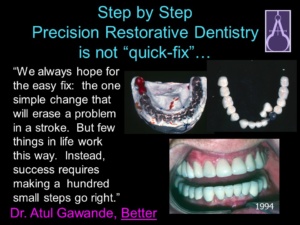 always hope for the easy fix: the one simple change that will erase a problem in a stroke. But few things in life work this way. Instead, success requires making a hundred small steps go right.” The only way to do consistently successful dentistry is never to skip the small steps. When steps are skipped errors are compounded and it becomes impossible to identify them, much less rectify them.
always hope for the easy fix: the one simple change that will erase a problem in a stroke. But few things in life work this way. Instead, success requires making a hundred small steps go right.” The only way to do consistently successful dentistry is never to skip the small steps. When steps are skipped errors are compounded and it becomes impossible to identify them, much less rectify them.
Dental education once demanded a high level of skill and diligence from students. As a dental student I had to develop a precision habits to accomplish gold foil restorations, which almost no one does in practice. The attention to detail and manual dexterity required to accomplish these restorations made students better adept to handle far more challenging procedures. Today gold foil restorations are not part of the curriculum. As a dental student I also had to do my own laboratory work, so I came to understand the problems technicians face in fabricating restorations. Dental students do not do laboratory work these days. How can you talk to laboratory technicians intelligently if you have no idea what they are doing?
Instead, students learn how to do sophisticated chairside digital restorations. The new dental school they built 5 miles from where I used to practice is filled with state-of-the-art digital equipment—equipment that is most likely not going to be available in residency programs. How are new graduates going to treat patients in the field without access to the fancy equipment? In truth the finest dental restorations can be accomplished without fancy equipment, and I have 70 years of documented cases to prove this point. Who will show new dentists the ropes if they do not acquire a mentor?
My mentor demanded nothing but the highest quality from me and I kept trying to please him until I got it right. He was the toughest of taskmasters. “If you think you can do better, why don’t you?” he once taunted me. It was so unpleasant! But he was absolutely right and today I am an excellent practitioner because he cared enough to make me rise to the occasion.
Today’s dental practitioners need mentors, but they are “too smart” for their own good. The real question is how can we—as a society–change the prevailing attitudes among young people so that new dentists will be eager to seek out mentors and better themselves?
Become the best practitioner in full coverage restorative dentistry that you can be! Don’t settle! Join the ONWARD program and learn how to do crown and bridgework with excellence and confidence, how to save “hopeless” teeth, and how to provide new options for patient treatment that you never thought of. Visit the website and join here: https://theonwardprogram.com/membership/
Dr. Feinberg is also available to give presentations. His CV and speaker packet is posted on the website. (https://theonwardprogram.com/about-dr-feinberg/) Dr. Feinberg can be reached at info@theONWARDprogram.com.

